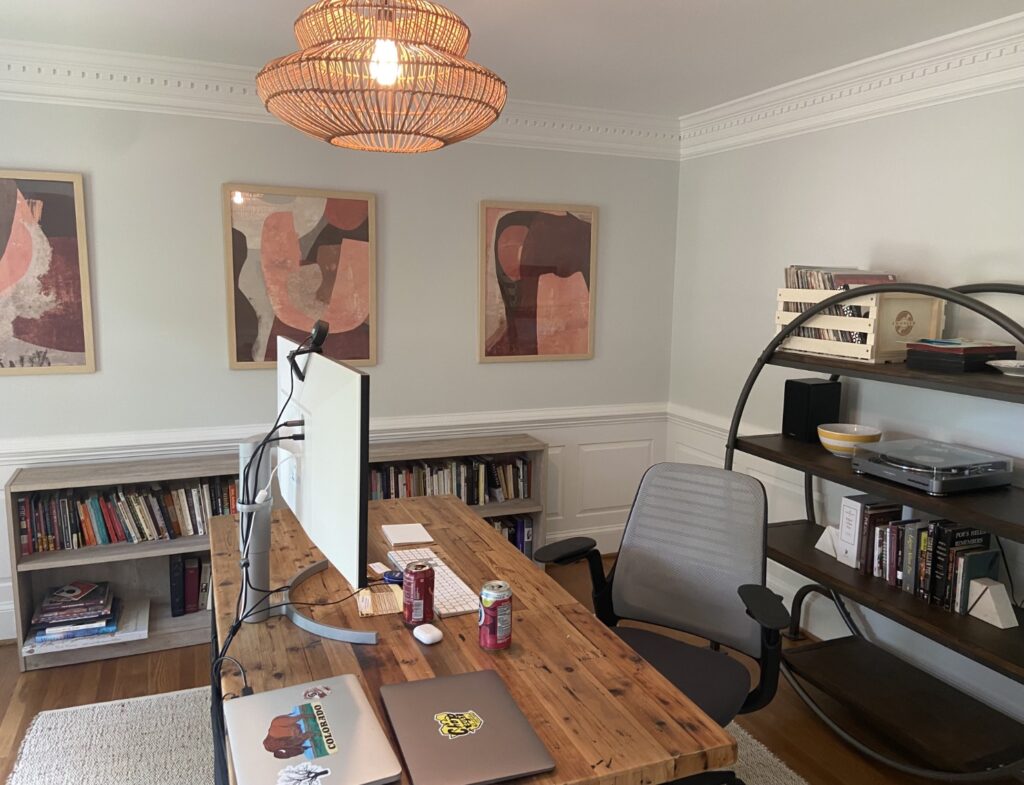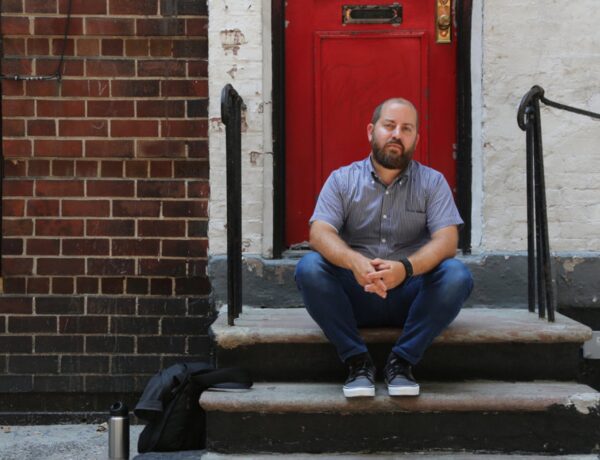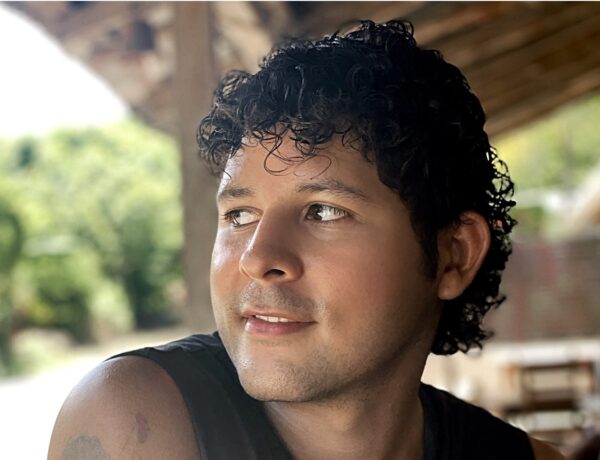Cat Baab-Muguira grew up in South Carolina and Richmond, Virginia, a middle child in a big Catholic family. she majored in English at the University of South Carolina, and completed an M.A. in Creative Writing at the University of Auckland, New Zealand.
She now lives in Richmond with her husband and son. As a freelance journalist, she has contributed to the Wall Street Journal, Slate, CNBC and NBC News, Lit Hub, Electric Lit, and many others. Poe for Your Problems is her first book.
Each week, we publish a new daily writing routine from a famous author. Subscribe to our newsletter so you don’t miss out!
Hi Cat, thanks for joining us today! We’re really excited to talk to you about your writing routine. For those who may not know, can you please tell us a little bit about yourself?
My name is Catherine Baab-Muguira, and I’m a writer and journalist. My first book, Poe for Your Problems: Uncommon Advice from History’s Least Likely Self-Help Guru, just came out from Hachette last year. Over the last years, I’ve contributed to the Wall Street Journal, Slate, Literary Hub, CNBC and NBC News, among many others.
Can you take us through the creative process behind your first book book, Poe for Your Problems?
Since I was a little kid, I’ve experienced depressive episodes, and a couple years ago, I found myself struggling through the sheer worst one yet. I couldn’t eat or sleep or function. I had to take mental-health leave from my job. Some strange intuition led me to start rereading Edgar Allan Poe’s work—and suddenly, I got him in a whole new way.
I realized his “spooky” stories about torture and premature burial are in fact deliberate, exquisite metaphors for the pain of the human condition, and that his biography is a heroic story of making art against the odds. Poe’s life was operatically tragic. He endured so much loss and disappointment that it’s amazing he wrote at all; he could’ve been forgiven for just drinking himself blind instead. As I read on, I was surprised to discover how funny the guy could be, too. His letters are so relatable: He bitches about his bosses, lies to his friends, puffs himself up to would-be employers and investors, the whole deal.
One night, I was having a beer with a friend of mine, and I started telling him all this—about how Poe is giving me, of all things, hope. My friend said, “That sounds like a book.”
It seemed like a joke that would end there—like, oh yeah, I’m really going to write a biography of Edgar Allan Poe/semi-satirical self-help book drawing out the perverse lessons of his life. Eventually I found I really was doing it.
In all, I spent around three years reading all of Poe, plus a great deal of the biographies and scholarship, which form an absurdly vast and complex corner of the literary universe, absolutely ridden with disputes and purposeful as well as inadvertent inaccuracies. Writing my book took about a year, essentially all of 2020, which was an interesting time to be a) pregnant and b) writing a comedy about life’s darkest realities.
What does a typical writing day look like for you?
Oh yes, I have a routine. I have to, because I’ve got a full-time job and a toddler, and just in general I’m so starved for time that I feel this constant physical need for rest, exercise, downtime, “hours of idleness”—like being hungry or thirsty. At the same time, I would not trade this life-phase. I want to soak up the young-family time, and that’s why I spend less time at my desk than I used to.
My routine begins with going to bed around 9 p.m. most nights, which means I’m able to get up at 4 or 5 a.m. to write. I slide out of bed trying desperately not to wake anyone, then I make some instant coffee and I go into my office, using my old MacBook in preference to the new one because, though it’s been eight months, I haven’t had time to set up the new one.
On a good day, I’ll get three hours or so of writing time. Before I had a baby, I used to be able to write on weekend afternoons and during some evenings, but that’s a thing of the past, at least for now. At this moment, as I write this, it’s just turned 5 a.m. on a Wednesday, and I almost want to apologize for this long-winded explanation, but it’s like Pascal said: “Sorry for the long letter. I didn’t have time to write a short one.”

Do you have a target word count that you like to hit each day?
Not really. Week to week, I’m usually hustling to meet some freelance deadline, while larger assignments—self-imposed or otherwise—I tend to give myself around six months or a year to finish, working in bursts to meet the goal.
Right now, I’m attempting a novel, and hoping to have a rough draft by the end of 2022. I find that if I try to force myself to write 500 words a day on it, I end up with prose that feels very token, and then I’ve got all this fluff—word count rather than story—that is a horrible downer to sort through because it’s just not very good. So, instead, I write in great bursts of inspiration and interest and then I edit for days, trying to fully inhabit every sentence and moment. Rinse, repeat.
How did the COVID-19 pandemic and lockdowns affect your routine?
I kind of think that period of my life would’ve been a lockdown whether COVID happened or not. I had my son in July of 2020, and before that, I was having a somewhat complicated pregnancy. I was also on deadline for my book, so even when I was in the hospital with pregnancy complications, I kept working—or, at least, doing the research-reading I needed to do, with some big biography resting against my big belly, eight inches from my face.
After my son was born, I’d be up for most of the night, because I’m not a person who can fall back asleep easily after being woken up. I dragged his bassinet into my home office and wrote in between his feedings. I can still feel the dimensions of that room, lit by my monitor, absolutely everything askew, laundry draped over the treadmill, that sort of thing, and a tiny baby asleep all of three feet from me. It was one of the most beautiful times of my life. Lots of transcendence, not much sleep.
What would be your top advice for writers out there trying to get published?
There’s an old and annoying saying about trying to run before you can walk, and it applies. Almost no one can write a decent book out of the gate, much less a great one. It takes years to learn how the genres and formats really work, whether we’re speaking of essays, short stories, pitches, tweets or Instagram captions, even. What’s more, having a track record of publication and audience-building can do more to get you an agent than a scintillating manuscript, and you’re going to need those pitching and audience-building skills once you’re out there promoting your books, anyway.
What I’m saying is: Your years of apprenticeship aren’t dispensable. They’re how you manage, over time, to have a writing career. Try walking first. Look to publish short things before long ones. If you can’t get some website to run your flash fiction or a personal essay, it’s going to be virtually impossible to convince a publisher to put out 80,000 words of yours while also taking on the financial risk of the project. But if you play the long game, piling up little wins, you’ll be in a good position to meet deadlines, promote your work, deal with the business side of publishing, etc.
The other thing is, for the love of God, look for ways to stay in touch with your audience as you’re building it. Stay on whichever social-media platform you can stand, and have a newsletter people can sign up to if they see something of yours and like it. Personally, I know I did all this way, way too late. It’s one of the biggest career mistakes I’ve ever made. In fact, back when I was struggling to get a publishing deal for my Poe book, a friend of mine who’s extremely successful, an author of bestsellers, said to me: “If you’d gotten serious about audience-building years ago, you wouldn’t be struggling now.” It’s true. Learn from my mistakes, friends!
What does your writing workspace look like?
We recently bought a fixer-upper and it’s beautiful—exquisite molding everywhere, a pleasant airiness to the rooms. Also, this house is ruining our lives. There’s always something breaking and something that needs doing.
Anyway, my office is in the old dining room. We stripped off the ‘80s wallpaper and replaced the crystal chandelier with an open-weave rattan fixture I saw on Instagram, which—am I right?—doesn’t really suit the vibe of the house. Lately there’ve been a lot of books pulled off the shelves because my toddler has an adorable habit of bringing me a biography of William Morris (or similar) and asking me to read it to him as though it’s Goodnight, Moon. I put the books away to take this photo, but I’m leaving out the samples of wood-blinds and empty La Croix cans for verisimilitude.
The desk is one I picked up in LA, when I was out there trying to do some screenwriting circa 2019. I answered a Craigslist ad and the seller turned out to be this hip talent-management agency on Melrose. Phil Lesh happened to be there that day and the staff kept shushing my husband and I as we huffed and puffed, hauling the heavy pieces out, and that’s just about as far as I ever managed to get in the business, pretty much. Oh well. It’s a nice desk.

Before you go…
Each week, we spend hours upon hours researching and writing about famous authors and their daily writing routines. It’s a lot of work, but we do it out of our love for books and learning about these authors’ creative process, and we certainly don’t expect anything in return. However, if you’re enjoying these profiles each week, and would like to send something our way, feel free to buy us a coffee!



No Comments